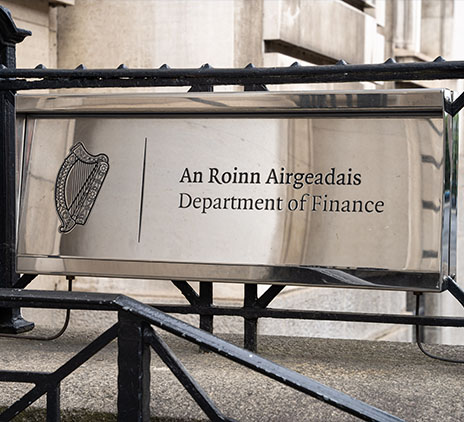-
Aviation Advisory
Our dedicated Aviation Advisory team bring best-in-class expertise across modelling, lease management, financial accounting and transaction execution as well as technical services completed by certified engineers.
-
Consulting
Our Consulting team guarantees quick turnarounds, lower partner-to-staff ratio than most and superior results delivered on a range of services.
-
Business Risk Services
Our Business Risk Services team deliver practical and pragmatic solutions that support clients in growing and protecting the inherent value of their businesses.
-
Deal Advisory
Our experienced Deal Advisory team has provided a range of transaction, valuation, deal advisory and restructuring services to clients for the past two decades.
-
Forensic Accounting
Our Forensic and Investigation Services team have targeted solutions to solve difficult challenges - making the difference between finding the truth or being left in the dark.
-
Financial Accounting and Advisory
Our FAAS team designs and implements creative solutions for organisations expanding into new markets or undertaking functional financial transformations.
-
Restructuring
Grant Thornton is Ireland’s leading provider of insolvency and corporate recovery solutions.
-
Risk Advisory
Our Risk Advisory team delivers innovative solutions and strategic insights for the Financial Services sector, addressing disruptive forces, regulatory changes, and emerging trends to enhance risk management and foster competitive advantage.
-
Sustainability Advisory
Our Sustainability Advisory team works with clients to accelerate their sustainability journey through innovative and pragmatic solutions.

-
 Asset management Asset management of the futureIn today’s global asset management landscape, there is an almost constant onslaught of change and complexity. To combat such complex change, asset managers need a consolidated approach. Read our publication and find out more about what you can achieve by choosing to work with us.
Asset management Asset management of the futureIn today’s global asset management landscape, there is an almost constant onslaught of change and complexity. To combat such complex change, asset managers need a consolidated approach. Read our publication and find out more about what you can achieve by choosing to work with us. -
 Internal Audit Maintaining Compliance with New EU Pension Directive IORP IIOn 28 April 2021, the Irish Government transposed IORP II (Institution for Occupational Retirement Provision), an EU directive on the activities and supervision of pension schemes, into law.
Internal Audit Maintaining Compliance with New EU Pension Directive IORP IIOn 28 April 2021, the Irish Government transposed IORP II (Institution for Occupational Retirement Provision), an EU directive on the activities and supervision of pension schemes, into law. -
 Risk, Compliance and Professional Standards FRED 82 – Periodic Updates to FRS 100 – 105The concept of a new suite of standards for the UK and Ireland, aligning with international financial reporting standards, was first conceived in 2002
Risk, Compliance and Professional Standards FRED 82 – Periodic Updates to FRS 100 – 105The concept of a new suite of standards for the UK and Ireland, aligning with international financial reporting standards, was first conceived in 2002 -
 Audit and Assurance Auditor transition: how to achieve a smooth changeoverAppointing new auditors may seem like a daunting task that will be disruptive to your business and a drain on the finance function. Nevertheless, there are a multitude of reasons to consider a change, including simply seeking a ‘fresh look’ at the business.
Audit and Assurance Auditor transition: how to achieve a smooth changeoverAppointing new auditors may seem like a daunting task that will be disruptive to your business and a drain on the finance function. Nevertheless, there are a multitude of reasons to consider a change, including simply seeking a ‘fresh look’ at the business.
-
Corporate Tax
Our Corporate Tax team is made up of more than 40 highly experienced senior partners and directors who work directly with a wide range of domestic and international clients; covering Corporation Tax, Company Secretarial, Employer Solutions, Global Mobility and Tax Incentives.
-
Financial Services Tax
The Grant Thornton team is made up of experts who are fully up to date in terms of changing and evolving tax legislation. This is combined with industry expertise and an in-depth knowledge of the evolving financial services regulatory landscape.
-
Indirect Tax Advisory & Compliance
Grant Thornton’s team of indirect tax specialists helps a range of clients across a variety of sectors including pharmaceuticals, financial services, construction and property and food to navigate these complexities.
-
International Tax
We develop close relationships with clients in order to gain a deep understanding of their businesses to ensure they make the right operational decisions. The wrong decision on how a company sells into a new market or establishes a new subsidiary can have major tax implications.
-
Private Client
Grant Thornton’s Private Client Services team can advise you on all areas of financial, pension, investment, succession and inheritance planning. We understand that each individual’s circumstances are different to the next and we tailor our services to suit your specific needs.

How has Brexit impacted VAT and customs for Irish businesses?
Since 2016, Brexit has been a worry for businesses the length and breadth of this island and the protracted and sensitive talks over the past year in the form of the Customs Trade Agreement now sets out the theory, while businesses work to put it into practice.
The Customs Trade Agreement, formally known as the EU-UK Trade and Co-operation Agreement (TCA), is the comprehensive free trade agreement between the UK and EU providing for zero tariffs and quotas on the trade in goods of UK and EU origin.
At Grant Thornton we have been working with businesses across Ireland over the last few years on their Brexit preparation. Our Cork office recently relocated to a new premises in One Penrose Quay to accommodate our expanding workforce and responding to the growing needs of our clients. I head up our Tax team in Cork and have been working locally and nationally with clients over the last few months, to ensure they have all the necessary structures and plans in place to deal with the impact of Brexit, safeguarding against any negative effects and positioning to take advantage of any opportunities. The first and most important step for businesses is to understand the various aspects of the Customs Trade Agreement in order to manage the implications correctly.
Rules of Origin
It is extremely important that businesses recognise what the “origin” of goods will be for the purposes of the TCA to fully realise the opportunities available within the Agreement.
Rules of Origin will apply to goods in order to qualify for preferential trade terms under the TCA, meaning that only goods with EU or UK preferential origin can benefit from zero tariffs and quotas.
The “origin” of a good is not determined from where the goods are transported rather it is the “economic nationality” of the goods. The rules in determining the origin of goods are complex, businesses will need robust customs policies, processes and procedures to ensure preferential origin can be claimed to avoid additional customs costs.
Under the TCA, goods are generally regarded as being either of EU or UK origin where they have been wholly obtained in either the EU or UK, such as livestock and raw materials; where they have been produced exclusively from originating materials. Yoghurt for example; or where goods have been produced using materials from outside the EU but which are sufficiently produced within the EU/UK.
And despite not eliminating customs duties on all trade in goods originating in the UK or the EU, it is the most extensive trade agreement on tariffs the EU has ever completed.
Northern Ireland Protocol
Alongside the TCA is the Northern Ireland Protocol – one of the most complex and sensitive topics to emerge during trade negotiations.
There are two key principles of the Protocol. Firstly, it avoids a hard border between Ireland and Northern Ireland, thereby enabling the smooth functioning of the all-island economy and safeguarding the Good Friday (Belfast) Agreement in all its dimensions.
Secondly, it ensures the integrity of the EU’s Single Market for goods, along with all the guarantees it offers in terms of consumer protection, public and animal health protection, and combatting fraud and trafficking,
The Protocol confirms that Northern Ireland is part of the UK customs territory but also must follow the rules of the EU Single Market for goods. Its standards remain harmonised with the EU and there is no need for regulatory checks on goods crossing the land border on the island of Ireland.
Customs and trade facilitations
The TCA also sets out the clear intentions from each party to cooperate and support compatibility in customs procedures and requirements in order to promote trade between the jurisdictions.
Several special procedures can be used to minimise the burden of customs administration. Businesses will need authorisation from Revenue and, in some cases, a comprehensive guarantee in place to avail of such procedures.
One such tool to minimise the administration is the Authorised Economic Operator (AEO) programme. This certifies that a business has met standards and allows holders to benefit from certain trade simplifications. Due to the resources required to comply with the authorisation, it will not suit many SMEs and it doesn’t prevent the application of potential tariffs but it will result in reduced customs checks and the potential fast tracking of consignments thought customs.
Postponed VAT Accounting for Import VAT
The Government introduced a postponed accounting scheme, which provides a cash flow benefit for companies post Brexit. This is part of the Government’s Brexit contingency plan. Postponed VAT accounting means that companies will not be required to pay import VAT at the point of entry and instead can account for such VAT in their periodic VAT return.
Extra Charges for Irish Consumers
Consumers in Ireland will also potentially face extra charges when purchasing goods from the UK. If the value of the good purchased exceeds €22 the consumer will be liable to pay import VAT at the standard rate of 23% and if the value exceeds €150 it is possible that customs duty may be applicable if the type of good did not ‘originate’ in the UK and that type of good is subject to customs duty. A typical purchase of an item such as a pair of trainers is likely to attract such charges.
Actions and insights
Businesses will already have felt the loss of freedom of the movement of goods between the EU and the UK. In particular, businesses importing goods to GB or importing goods from GB will have faced costly customs compliance obligations and an increase in administration and paperwork.
Supplier and customer contracts should be reviewed to ensure the best possible position for Irish businesses as the commercial terms or incoterms will have a bearing on the VAT and customs implications arising. Irish suppliers are agreeing Delivery Duty Paid terms with UK customer, this creates a UK VAT registration for the Irish business.This has created additional costs for businesses in terms of ongoing compliance obligations and additional paperwork. It will come as some relief to Irish businesses to hear that in my experience, Irish businesses seem to have been better prepared to complete the additional paperwork than businesses in Great Britain.
In order to qualify for duty-free access, businesses will need to check they meet the Rules of Origin in order to benefit from the preferential zero duty rate. In addition, businesses will need to manage a number of customs requirements, such as classifying and valuing goods and determining which goods are subject to licensing restrictions.
Businesses should also monitor the development of the new TCA terms and associated guidance during 2021 in order to be in a position to avail of any future simplifications.










